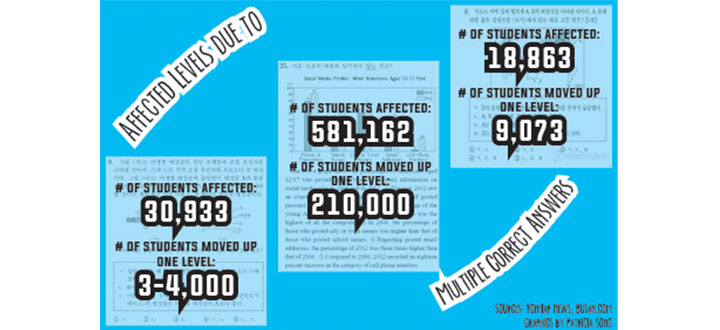Every year, Korean high school seniors take the College Scholastic Aptitude Test (CSAT), also known as Su-neung. The overall low difficulty and presence of two ambiguous questions on this year’s CSAT caused controversy, due to the importance of the CSAT regarding Korean college admissions.
According to the Joongang Daily, this year’s CSAT was much easier than last year’s, as indicated by the greater number of perfect scores. Although CSAT scores themselves are not based on a curve, the “level,” or deung-gup, that students are assigned to is based on a curve. This meant that the relatively low difficulty of the test made each question more important in determining a student’s level. Additionally, the Korea Institute for Curriculum and Evaluation (KICE), which is in charge of the national test making process, decided to accept two answers to question number eight on Biology II and number 25 on English. Although the English question did not affect many students, the decision to accept two answers for the Biology II question resulted in a 1.3-point average increase and 4,000 students levelling up, as only 10 percent of the test-takers had previously answered the Biology II question correctly. At the same time, 3,000 students to dropped to a lower level because of the curve.
“I know that many students want the test to be difficult so that the universities can distinguish between students more easily,” Rachel Kang (10) said. “The fact that this year’s test was easy is a problem in the eyes of many seniors because it makes it that much more difficult to be placed into a good deung-gup. My sister, a current senior at a Korean high school, mentioned that many of her friends were angered by the change in accepted answers because it made it more important to get every question right, as one error could determine which university they could get into.”
Such controversies existed last year as well, but the mistakes were only recently recognized. On Nov. 18, when the Education Department accepted all answers to a vague World Geography question, the scores of 18,863 students were affected either negatively or positively. According to Gray Macklin, Testing & AP Coordinator, this trend of testing controversies reflects the changing patterns of Korean society.
“Problems with test questions could have always existed,” Mr. Macklin said. “Kids in the past may have not recognized the problems, but now they are generally smarter. Students are increasingly willing to challenge the test authorities. In the end, all this controversy points to how the standardized testing method is outdated. So much of it is based on a homogeneous mindset where everyone wants to go to Seoul National University. But now things are slowly changing, and the educational processes should reflect that.”
By Patricia Song

